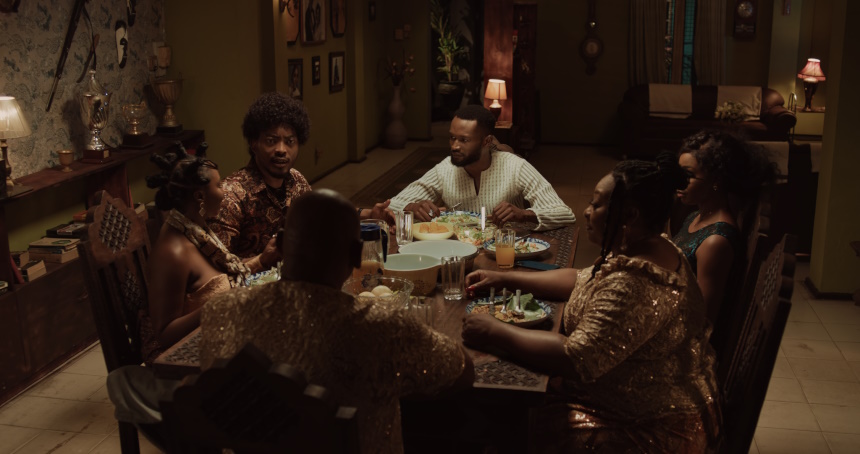Tribeca 2024 Review: THE WEEKEND, Guess Who's Coming To Dinner?

The horror of introducing a new partner to one’s family is a very real thing. We all have skeletons in our closets; embarrassing relatives, trepidation about showing someone where we come from, rituals and traditions that we only realize are strange once we strike out into the wider world. In his new film, The Weekend, Nigerian filmmaker Daniel Oriahi follows one such sojourn a rather unique heart of darkness where it only takes a couple of days to expose a deadly family secret.
Nikya (Uzoamaka Aniunoh) and Luke (Bucci Franklin) are a happy, recently engaged couple with a bright future ahead. Nikya was orphaned young and has always longed for a family to call her own, and though Luke’s family remains largely intact, he’s long since fallen out with them. In the spirit of reconciliation, Nikya convinces her beau to trek from the city to his rural hometown for a weekend of celebration as a holiday looms around the corner. Luke begrudgingly agrees, but even this short trip will test the boundaries of what it means to be a part of this clan.
The couple arrive to great fanfare, since Luke has been gone for so long, the rest of his family is happy to get him back, even as he is hesitant to fully embrace them. Also joining them is his sister, Kama (Meg Otanwa) and her affluent/annoying boyfriend Zeido (James Gardiner), along with Luke and Kama’s parents, father Meki (Keppy Ekpeyong Bassey) and mother, Omicha (Gloria Anomie-Young). There’s a definite tension between Luke and the rest of the relatives, but Nikya plays the dutiful bride-to-be and does her best to fit in and impress. Little does she know that it will take more than playing house to be accepted, and she’s about to learn some hard lessons.
Oriahi’s narrative and screenplay begin like many similar stories, in fact, there’s a parallel pitch to The Weekend that we’ve already seen executed brilliantly in films like Get Out and Ready or Not. This film has the advantage of placement in an unfamiliar milieu, which catches the western viewer off guard when it comes to matters of tradition. The Nigerian setting isn’t so foreign as to be completely alien, however, it does give one pause when things don’t go exactly as we would expect. Is this a cultural difference or is it actually strange the way we think it is, it’s a question that keeps the viewer on their toes.
However, it doesn’t take long before it becomes clear that Nikya is in a bit over her head, and Luke was probably right to stay away, but they’re in it now, and the only way out is through.
The Weekend takes a radical turn in the third act, unveiling an age-old local custom that puts everyone not related by blood in danger (and blood might not even save some of them). Oriahi’s script does an excellent job of ratcheting up the tension, and when the dam bursts, the resulting sanguine flood is deliriously entertaining. What was a black fish-out-of-water comedy becomes a full-on survival horror, with an ending that is as shocking as it is inevitable upon reflection.
An easy entry into African horror, The Weekend delivers a uniquely Nigerian take on recognizable tropes and really nails the landing. This is definitely one to look out for, and make sure you come hungry.







